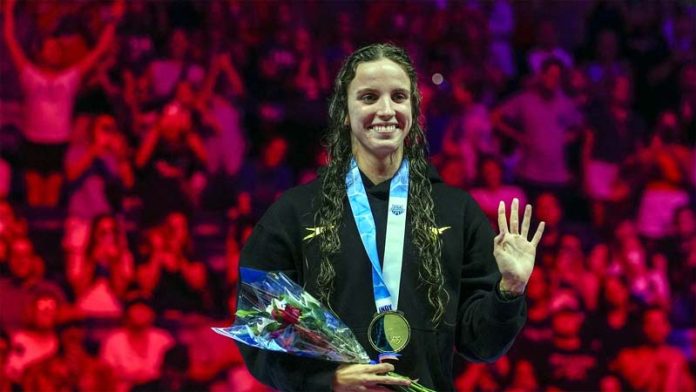INDIANAPOLIS, Jun 19: This world record was five years in the making for Regan Smith. What an up-and-down journey it’s been.
Bouncing back from a close-but-no-Olympics call in her first race, Smith set a world record in the women’s 100-meter backstroke at the US swimming trials on Tuesday night.
The 22-year-old Minnesota native touched in 57.13 seconds, easily beating the mark of 57.33 set a year ago by Australia’s Kaylee McKeown.
Smith was just 17 when she first set a world record in the 100 at the 2019 World Championships. But, she struggled to deal with the sudden, newfound fame, ceding dominance in the event to McKeown.
“A long time coming,” Smith said. “It’s about time.”
There was never any doubt about Smith’s talent, but a lack of confidence was almost crippling at times.
She’s been working with a sports psychologist since October, which helped turn things around mentally.
Her coach, Bob Bowman, best known for his work with 23-time gold medalist Michael Phelps, took care of the physical side with a gruelling training regimen.
“This is incredibly rewarding,” Smith said. “When I was a teenager, I had not done much. There was no pressure on me. I was always the youngest. No one expected much from me. I could go into it fearless.”
Once she tasted success, it was hard to get back on top. She made the US team for the Tokyo Olympics but finished third in the backstroke as McKeown took the gold.
“I’ve always had it physically, but I didn’t have it mentally,” Smith conceded. “I just didn’t have it up here,” pointing toward her head.
Showing how much her confidence has grown, Smith bounced back emphatically after getting edged for a spot on the US team in the 100 butterfly, where she finished third behind Gretchen Walsh and Torri Huske.
Flipping to her back, Smith set the second world record of the trials, following Walsh’s mark in the semi-finals of the 100 fly.
Katharine Berkoff claimed the second expected Olympic spot for the US with a time of 57.91.
In the night’s other final, Bobby Finke earned the right to defend the 800 freestyle gold he won in Tokyo with a time of 7 minutes, 44.22 seconds.
Finke had to work hard to get to the wall ahead of 18-year-old Indiana phenom Luke Whitlock, who set a national age-group record at 7:45.19 and will likely head to his first Olympics with the second US spot.
No one else was within 4 seconds of the top two.
“I find I need pressure to do well, at least in my eyes,” Finke said. “So I feel like the more pressure I feel, then the more likely I am to do well. Happy with the time we got.”
Whitlock splashed the water emphatically after going virtually stroke-for-stroke with the reigning Olympic champion, who swept the 800 and 1,500 free in Tokyo.
He is expected to become the youngest male swimmer to make the US team since that guy named Phelps, who was 15 when he qualified for his first Olympics in Sydney in 2000.
“It’s really just over the last, especially the last two months, my training has really picked up and now just talking to my coach, we just had a really good plan,” Whitlock said.
“We kind of got everything planned out like a month and a half before this and I was just really confident with the work I’ve been putting in, so I knew I could execute it.”
Two of America’s biggest swimming stars, Caeleb Dressel and Simone Manuel, had impressive debuts at the trials, though there’s still work to do to return to the Olympics.
Dressel was the third-fastest qualifier in the preliminaries and semi-finals of the men’s 100 freestyle, both times finishing behind Jack Alexy and Chris Guiliano.
The tattooed Floridian will have to beat at least one of them in the final on Wednesday night to earn a chance to defend his Olympic title in that event.
Manuel was the fastest qualifier in the women’s 100 free preliminaries and took the second spot behind Torri Huske in the semi-finals.
Dressel and Manuel are both coming back from long layoffs that cast doubts over whether they’d be able to qualify for Paris.
Dressel was the winner of five gold medals at the Tokyo Olympics. He mysteriously walked away amid the 2022 World Championships, later revealing he needed an extended break to rekindle his love for the sport.
Manuel, the first Black female swimmer to capture an individual gold medal, was diagnosed with overtraining syndrome ahead of the last Olympics.
She barely managed to qualify for the U.S. Team, then shut down all physical activity under a doctor’s care to allow her body to recover. (AP)


